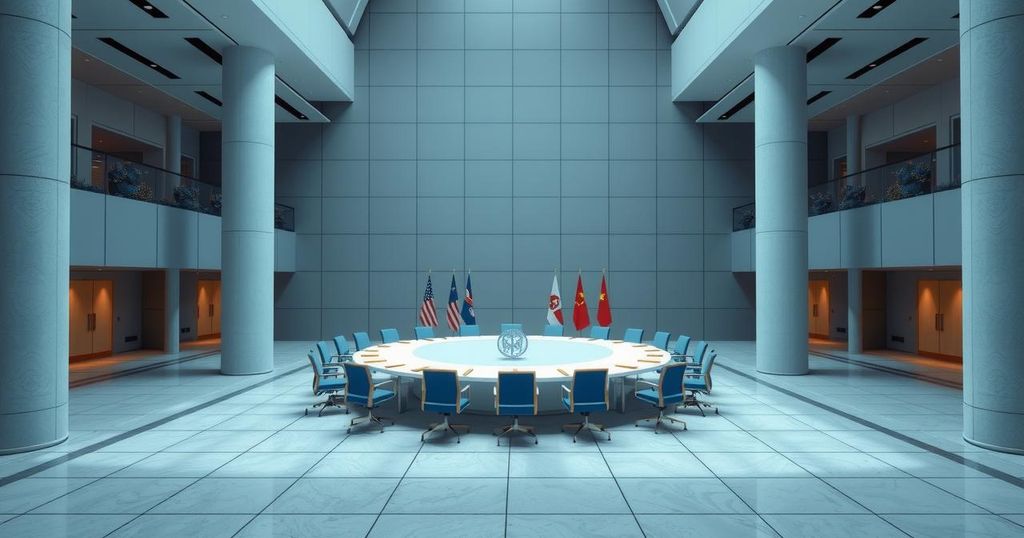At the UNGA 79, Egyptian Foreign Minister Badr Abdelatty condemned Ethiopia for unilateral actions concerning the Grand Ethiopian Renaissance Dam (GERD), asserting that Egypt would not ignore the existential threat posed by the dam. He emphasized Egypt’s ongoing concerns over water rights and the need for a binding agreement to protect the water supply essential for millions, as Ethiopia continues its operations without consent. Egypt’s water security is critical, with the nation’s per capita supply far below the threshold for water scarcity.
During the high-level General Debate of the 79th session of the United Nations General Assembly (UNGA 79), Egyptian Foreign Minister Badr Abdelatty expressed Egypt’s firm stance regarding the existential threat posed by Ethiopia’s actions concerning the Grand Ethiopian Renaissance Dam (GERD). He articulated that Egypt would not ignore this threat and condemned Ethiopia for seemingly disregarding the well-being of Egyptian and Sudanese populations. Minister Abdelatty emphasized that Egypt has been steadfast in addressing the implications of the Ethiopian dam while asserting its rights under the United Nations Charter to protect its vital interests and ensure the welfare of its citizens. He underscored that Ethiopia’s unilateral decisions regarding GERD represent a stark violation of international law, particularly referencing the Declaration of Principles agreement established in 2015 and a Security Council Presidential Statement from 2021. Abdelatty highlighted the futility of the last thirteen years of negotiations, which were predominantly influenced by Ethiopian obstinacy and attempts to impose decisions unilaterally regarding dam operations. Given Egypt’s significant dependency on the Nile, which is crucial to its water supply, Minister Abdelatty labeled the dam’s construction an imminent threat. Egypt seeks a binding agreement with Ethiopia to secure water rights, but it faces ongoing challenges as Ethiopia has proceeded with dam operations without consensus. With per capita water availability dropping to approximately 550 cubic meters annually, far beneath the global threshold for water scarcity, Egypt regards its water security as a matter of red-line importance. President Abdel Fattah El-Sisi’s remarks reinforce this position, indicating that any meddling with Egypt’s share of the Nile water would have profound regional repercussions. Despite Ethiopia’s portrayal of the dam as advantageous for all parties, Egyptian officials have raised concerns about its political implications aiming for dominance over the Nile River. Recent negotiations have faltered due to Ethiopia’s unwillingness to accept compromise on technical or legal matters that could benefit all three nations involved. Minister Abdelatty’s communication to the UN Security Council reiterates Egypt’s condemnation of Ethiopia’s provocative actions, emphasizing the need for regional cooperation rather than discord among neighboring countries.
The discussion surrounding the Grand Ethiopian Renaissance Dam (GERD) is a significant point of contention in the relations among Egypt, Sudan, and Ethiopia. The GERD construction has been ongoing since 2011, and it is perceived by Egypt as a threat to its water security due to the country’s heavy reliance on the Nile River for its freshwater supply. Current estimates suggest that Egypt’s per capita annual water availability is alarmingly low, leading to concerns of impending water scarcity, which is critically below the internationally recognized threshold. The historical context includes numerous negotiation attempts that have repeatedly stalled, mainly owing to Ethiopia’s unilateral decisions and lack of cooperation on water rights agreements. Minister Abdelatty’s remarks reflect Egypt’s strategic objectives to safeguard its national interests in the face of unilateral actions it deems threatening. The broader regional implications of the dam’s operations also necessitate ongoing diplomatic scrutiny and dialogue to prevent further tensions and foster cooperation among the Nile Basin countries.
In conclusion, Minister Badr Abdelatty’s address at UNGA 79 underscores Egypt’s unwavering commitment to defending its rights and addressing the existential threats posed by Ethiopia’s actions regarding the GERD. The prolonged dispute emphasizes the urgency for a binding agreement to protect water rights and ensure sustainable cooperative relations among Egypt, Sudan, and Ethiopia. The remarks resonate with Egypt’s overarching strategy to safeguard its water security amid a climate of regional tension, while also raising concerns for the broader geopolitical stability of the Nile Basin.
Original Source: www.egypttoday.com




